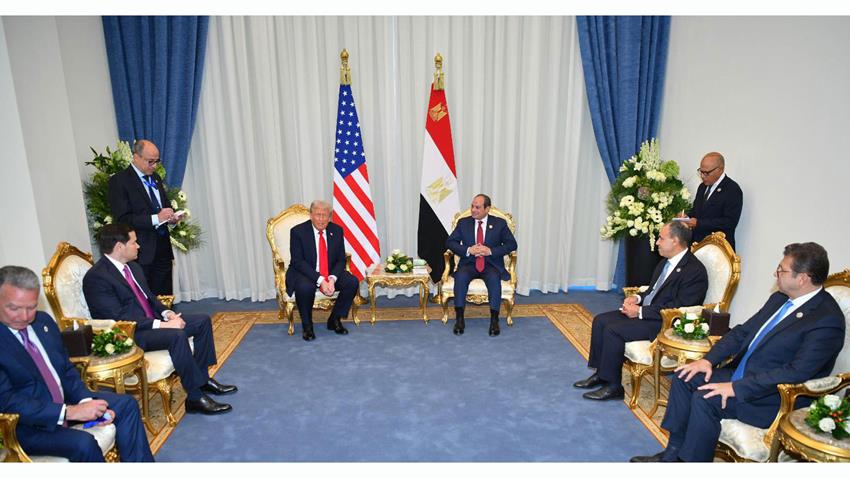Egypt reaffirmed its role as a cornerstone of regional stability and diplomacy during the Sharm El-Sheikh Peace Summit held on 13 October, co-chaired by President Abdel Fattah El-Sisi and U.S. President Donald Trump. The landmark gathering, which united leaders from over twenty nations to endorse a peace declaration supporting the Hamas–Israel agreement, also opened the door to significant economic opportunities for Egypt.
Beyond its diplomatic success, the summit positioned Egypt as a key player in the region’s post-conflict reconstruction and trade revival. By leading the path toward peace, Cairo stands to benefit from increased investment flows, expanded regional partnerships, and new development projects, marking the start of a potential new era of economic growth driven by stability.
Gaza reconstruction
The summit, building on the momentum of President Trump’s 20-point “Peace Plan” unveiled on September 29, 2025, outlined a ceasefire, hostage exchange, and reconstruction framework, alongside governance reforms envisioning the territory as a demilitarized zone under international oversight.
With Egypt playing a central role in the negotiations, the plan gained credibility and traction among regional stakeholders.
“This achievement heralds the birth of a genuine ray of hope, which promises to close a painful chapter in human history, usher-in a new era of peace and stability in the Middle East, and secure a better future for the peoples of the region, who have been ravaged by conflict,” President El-Sisi declared, emphasizing the historic weight of the moment.
According to the United Nations, an estimated $70 billion will be required to rebuild Gaza.
Meeting challenges with vision
The peace declaration carries profound economic implications that Egypt is uniquely positioned to leverage. Medhat Nafei, renowned economist, Chairman of Arab Alloys, and member of the Prime Minister’s Macroeconomic Committee, told Business Monthly that Egypt’s industrial and logistical strength places it at the forefront of post-conflict reconstruction efforts.
“The sectors most likely to benefit are building materials, construction, food and beverages, energy, and maritime transport and logistics,” he said. “Egypt possesses an industrial base and extensive implementation experience accumulated through major infrastructure projects over the past decade, which qualifies it to participate in the reconstruction of Gaza and neighboring countries,” Nafei added.
Additionally, the Suez Canal ports and the Suez Canal Economic Zone could become hubs for the movement of materials and equipment to regional markets,” he noted.
By combining industrial capacity, strategic geography, and policy reforms, Egypt is poised to translate diplomatic success into tangible economic gains. Nafei further explained how Egypt’s infrastructure gives it a distinct advantage in leading regional economic integration.
“The Suez Canal, along with Egypt’s ports on both the Mediterranean and Red Seas and its regional energy networks, provides a strong basis for such economic integration. To fully capitalize on this potential, Egypt needs a strategic vision that converts its geographical position into tangible economic value through free trade agreements, joint logistics platforms, and regional partnerships rather than allowing its location to remain an untapped advantage.”
The peace declaration, he added, will only accelerate this trajectory—solidifying Egypt’s role as a regional hub linking Africa, the Gulf, and Europe.
While opportunities are abundant, Egypt still faces structural and operational challenges. Nafei acknowledged the complexity of scaling up capacity to meet reconstruction demand.
“The capacity partially exists — Egypt has developed its building materials and engineering industries, but faces challenges in financing, supply chains, and high energy and transport costs,” he added.
Nafei highlighted that real expansion will require Arab coordination on procurement and technical standards, along with export incentives and concessional financing for factories entering this reconstruction pathway. Rather than obstacles, these challenges represent opportunities for regional coordination, industrial upgrading, and strategic investment partnerships.
Reform as the foundation for growth
Egypt’s readiness to seize this moment stems from the government’s structural reforms over the past two years. Speaking to Bloomberg on October 14, Rania Al-Mashat, Minister of Planning, Economic Development, and International Cooperation, highlighted the measures launched in March 2024 to address fiscal pressures, including declining Suez Canal revenues.
She emphasized that these steps have already strengthened economic performance, with GDP growth reaching 4.4% by the end of June and rising to 5% in the final quarter.
“We expect 2026 to be a turning point for the Egyptian economy, with continued growth in real economy sectors, particularly industry, and increased revenues from tourism and the Suez Canal,” she added.
These reforms—including monetary tightening, fiscal consolidation, adoption of a flexible exchange rate, and a cap on public investments—have laid the groundwork for a more resilient and competitive economy.
The bottom line
The Sharm El-Sheikh Peace Summit represents more than a diplomatic success; it marks a turning point in Egypt’s modern economic narrative. Through peacebuilding, reform, and strategic vision, Egypt is not only reinforcing its leadership in regional stability but also unlocking unprecedented opportunities for investment, growth, and development—ushering in a new era where diplomacy drives economic transformation.




